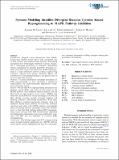| dc.contributor.author | Claas, Allison Mary | |
| dc.contributor.author | Atta, Lyla H. | |
| dc.contributor.author | Gordonov, Simon | |
| dc.contributor.author | Meyer, Aaron Samuel | |
| dc.contributor.author | Lauffenburger, Douglas A | |
| dc.date.accessioned | 2018-07-31T15:51:49Z | |
| dc.date.available | 2018-07-31T15:51:49Z | |
| dc.date.issued | 2018-07 | |
| dc.date.submitted | 2018-05 | |
| dc.identifier.issn | 1865-5025 | |
| dc.identifier.issn | 1865-5033 | |
| dc.identifier.uri | http://hdl.handle.net/1721.1/117218 | |
| dc.description.abstract | Introduction - Targeted cancer therapeutics have demonstrated more limited clinical efficacy than anticipated, due to both intrinsic and acquired drug resistance. Underlying mechanisms have been largely attributed to genetic changes, but a substantial proportion of resistance observations remain unexplained by genomic properties. Emerging evidence shows that receptor tyrosine kinase (RTK) reprogramming is a major alternative process causing targeted drug resistance, separate from genetic alterations. Hence, the contributions of mechanisms leading to this process need to be more rigorously assessed. | en_US |
| dc.description.sponsorship | National Institutes of Health (U.S.) (Grant R01-CA96504) | en_US |
| dc.description.sponsorship | National Institutes of Health (U.S.) (Grant U54-CA217377) | en_US |
| dc.description.sponsorship | United States. Army Research Office (grant W911NF-09-0001) | en_US |
| dc.publisher | Springer US | en_US |
| dc.relation.isversionof | https://doi.org/10.1007/s12195-018-0542-y | en_US |
| dc.rights | Creative Commons Attribution | en_US |
| dc.rights.uri | http://creativecommons.org/licenses/by/4.0/ | en_US |
| dc.source | Springer US | en_US |
| dc.title | Systems Modeling Identifies Divergent Receptor Tyrosine Kinase Reprogramming to MAPK Pathway Inhibition | en_US |
| dc.type | Article | en_US |
| dc.identifier.citation | Claas, Allison M., Lyla Atta, Simon Gordonov, Aaron S. Meyer, and Douglas A. Lauffenburger. “Systems Modeling Identifies Divergent Receptor Tyrosine Kinase Reprogramming to MAPK Pathway Inhibition.” Cellular and Molecular Bioengineering (July 26, 2018). | en_US |
| dc.contributor.department | Massachusetts Institute of Technology. Department of Biological Engineering | en_US |
| dc.contributor.department | Massachusetts Institute of Technology. Department of Biology | en_US |
| dc.contributor.department | Massachusetts Institute of Technology. Department of Chemical Engineering | en_US |
| dc.contributor.department | Koch Institute for Integrative Cancer Research at MIT | en_US |
| dc.contributor.mitauthor | Claas, Allison Mary | |
| dc.contributor.mitauthor | Atta, Lyla H. | |
| dc.contributor.mitauthor | Gordonov, Simon | |
| dc.contributor.mitauthor | Meyer, Aaron Samuel | |
| dc.contributor.mitauthor | Lauffenburger, Douglas A | |
| dc.relation.journal | Cellular and Molecular Bioengineering | en_US |
| dc.eprint.version | Final published version | en_US |
| dc.type.uri | http://purl.org/eprint/type/JournalArticle | en_US |
| eprint.status | http://purl.org/eprint/status/PeerReviewed | en_US |
| dc.date.updated | 2018-07-27T03:35:54Z | |
| dc.language.rfc3066 | en | |
| dc.rights.holder | The Author(s) | |
| dspace.orderedauthors | Claas, Allison M.; Atta, Lyla; Gordonov, Simon; Meyer, Aaron S.; Lauffenburger, Douglas A. | en_US |
| dspace.embargo.terms | N | en_US |
| dc.identifier.orcid | https://orcid.org/0000-0003-1224-8153 | |
| dc.identifier.orcid | https://orcid.org/0000-0001-6284-2711 | |
| dc.identifier.orcid | https://orcid.org/0000-0002-0050-989X | |
| mit.license | PUBLISHER_CC | en_US |
